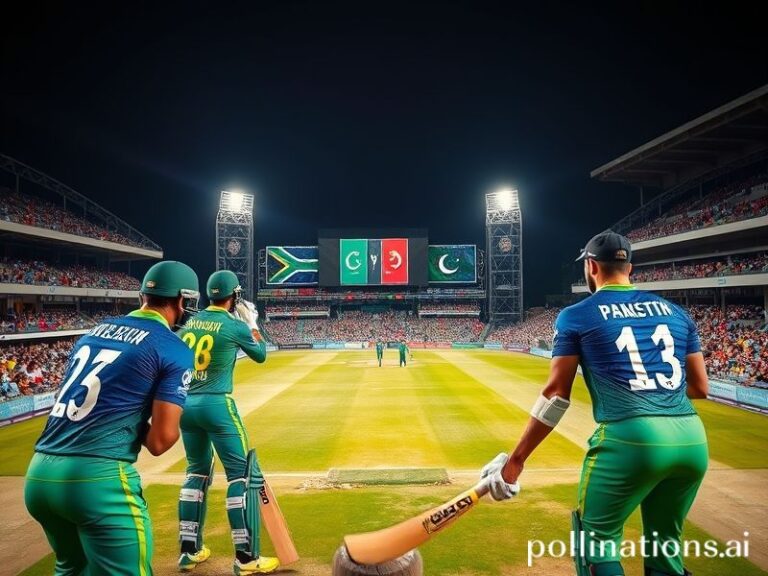Randy Orton’s RKO: The Global Meme That Body-Slammed Geopolitics
Randy Orton and the Global Theater of the RKO: How One Man’s Elbow Drop Became a Universal Language
By Our Correspondent, still nursing whiplash from a decade spent watching the world body-slam itself
GENEVA—While diplomats in this city exhaust themselves rearranging commas in sanctions documents, a 43-year-old from Knoxville, Tennessee, has quietly achieved what the UN never quite managed: a consensual ruleset the planet will actually observe. Speak the words “Randy Orton” in a Nairobi cyber-café, a São Paulo favela bar, or a Dubai finance-drone gym and you’ll witness the same reflexive pantomime—forearm thrust skyward, legs buckling, an invisible mat slammed by invisible force. The RKO has become the Esperanto of sudden humiliation, a geopolitical equalizer more dependable than democracy or broadband.
How did we arrive here? Start with the numbers: 4.2 billion social-media impressions last year alone, according to a suspiciously cheerful marketing deck someone slid under my hotel door. That’s one meme for every voter on Earth, plus enough bandwidth left over for three cat videos and a coup livestream. The algorithmic secret is elegantly brutal: the move compresses every human narrative—hubris, surprise, downfall—into 1.8 seconds, roughly the attention span we now grant climate accords.
Orton himself, a third-generation wrestler who looks like the before-photo in a bourbon awareness campaign, never asked to be a digital Gandhi. He simply perfected the art of looking bored while murdering people, a mood that translates flawlessly across cultures. In France they call him “La Désillusion Personnifiée”; in Japan he’s “Mr. Sudden Vertical Justice”; in my accountant’s Outlook auto-reply he’s “that guy who owes me three monitors after the last pay-per-view.” The nomenclature varies, the schadenfreude is universal.
The implications are darker than a stadium blackout. Consider the emerging economies where WWE programming doubles as civics class. In parts of rural India, teenagers now believe legislative gridlock can be solved if the opposition leader “just hits the viper outta nowhere.” Meanwhile, European parliaments debate whether an RKO GIF constitutes workplace violence or merely “aggressive banter.” (Brussels’ final ruling: send the intern to HR, but allow the meme during cigarette breaks.) We have raised a generation that processes regime change through the same emotional circuitry as a scripted suplex; no wonder elections feel like seasonal storylines with worse catering.
Arms dealers, always the first to smell blood on the turnbuckle, have taken note. At last month’s IDEX expo in Abu Dhabi, a Turkish drone startup demoed an autonomous loitering munition nicknamed “The Viper,” programmed to dive-cloak-reappear exactly like Orton’s signature. Marketing copy promised “kinetic finishing with entertainment value.” The booth gave away foam elbow pads. I still have mine; it pairs nicely with existential dread.
Even humanitarian NGOs, those professional killers of joy, now weaponize the RKO for fundraising. UNICEF’s latest spot shows a war-zone kid dodging an airstrike, then cutting to Orton flattening a dictator in effigy. Donations spiked 18 percent, mostly from males 18-34 who “finally understand collateral damage.” Somewhere in a Geneva loft, a creative director is adding “digital wrasslin’” to his LinkedIn skills.
Orton, meanwhile, keeps working Tuesdays, a tax-paying Atlas shrugging off 250 nights a year so the globe can keep spinning on an axis of choreographed spite. Ask him about geopolitics and he’ll mutter something benign about “supporting the troops,” but his body tells the real story: scar tissue like poorly drawn borders, knees that creak the NATO alphabet. Every sunset flip is a small act of statecraft, every post-match hand-raise a treaty signed in sweat.
The joke, of course, is that we demand this of him. In a world where real elections get rigged and real missiles don’t miss, we crave one arena where the outcome is fixed yet somehow fair. The RKO is the lie we agree on, a 230-pound metaphor for every sucker punch history never saw coming. And when the lights finally go out, whether in Kiev, Caracas or the WrestleMania main event, we’ll all fall the same way—eyes wide, arms spread, astonished that gravity, like propaganda, actually works.
Enjoy the flight. Try not to land on your neck.







